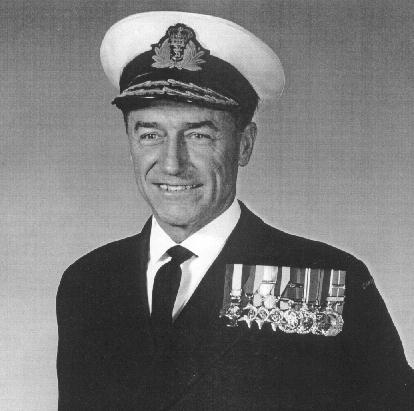
1913 – 2005
Desmond William “Debby” Piers was born and raised in Halifax, a fitting hometown for a boy who would become one of Canada’s greatest naval officers. In 1930, he left Halifax at age 18 to attend RMC.
Piers arrived at the college with athletic strength and stamina and demonstrated his abilities by winning the annual recruit obstacle race – an individual event at that time. In 1932, Piers left the college to become a Midshipman and, in 1935, was commissioned in the Royal Canadian Navy (RCN) - a first for an RMC Gentleman Cadet.
As was customary at the time, Piers spent five years receiving naval officer training with the Royal Navy (RN). At the outbreak of World War II, he was the second-in-command of HMCS Restigouche which deployed from Esquimalt to Halifax to begin Atlantic convoy escort operations. In June 1940, Restigouche was one of seven RCN destroyers evacuating troops from Dunkirk. While taking off wounded from the town of St. Valery, she was ordered to assist in the evacuation of the 51st Highland Division. The Captain asked Piers to send someone ashore to get in touch with the Division Commander to coordinate the mission. Feeling a high sense of duty and, despite the danger, Piers went ashore himself. The General refused evacuation since he was holding the flank protecting others under evacuation. Under intense small arms fire, Piers got back aboard his ship just as German tanks had overrun the Scottish forces, reaching the nearby cliff and began shelling the Allied ships.
In 1941, at age 27, Piers was promoted to Lieutenant-Commander and appointed Captain of Restigouche and commander of a Convoy Escort Group. Not only was he the youngest ship’s commanding officer in the RCN or the RN, he went on to establish an incredible record of not losing a single convoy ship in his first two years in command. In September 1943, while escorting a 42-ship convoy, aided by just four poorly equipped corvettes and without air protection, his convoy SC-107 was attacked by two German submarine wolf packs comprising 17 U-boats. Although the convoy lost 15 ships that night, Piers was later awarded the Distinguished Service Cross for gallantry in operations against the enemy at sea and an inspiration to those under his command.
In February 1944, Piers took command of the newly constructed HMCS Algonquin and for the next year and a half he engaged in frequent combat operations including D-Day bombardment of enemy positions near Juno Beach, destruction of German shipping off the Norwegian coast and escorting convoys on the Murmansk Run. In early 1945, Algonquin returned to Halifax to get ready for the war in the Pacific, and Piers finally came ashore after 63 months of sea duty. In 2004, Piers received France’s highest honour for bravery in military action and service - L’Ordre National de la Legion d’Honneur.
After the war, Piers held several senior positions, including Executive Officer of the aircraft carrier HMCS Magnificent, Commanding Officer of the cruiser HMCS Quebec, Commander, First Canadian Destroyer Squadron and Senior Canadian Officer Afloat (Atlantic).
In 1957 he was promoted Commodore and appointed Commandant of RMC, the first naval officer to hold that position. During his three years as Commandant, Piers was popular with the cadets, seen as a fit, role model whose wartime service was both incredible and inspirational. He prided himself in getting to know, and being very active with, the cadets and invited all First Years to dinner at the Commandant’s residence. He was also instrumental in the opening of the Massey Library and the restructuring of the academic wing.
Promoted Rear-Admiral in 1962, he served as Chairman of the Canadian Defence Liaison Staff (Washington) and Canadian representative on the NATO Military Committee.
Piers retired from the RCN in 1967 and, while residing in Chester NS became actively engaged in voluntary work in education, sports, the training of the handicapped, the arts and tourism. He was honoured in 1977, when he was appointed Agent General of Nova Scotia to the United Kingdom and Europe. In 1978, he was made a Freeman of the City of London and was given an Honorary Doctorate of Military Science from RMC. He was made a Member of the Order of Canada in 1982.
Piers’ naval exploits, courageous leadership and stellar command performances in the Royal Canadian Navy are recognized as significant contributions to Canada both in wartime and in peacetime.
Plaque Inscription:
Sailor, Naval Commander, Leader